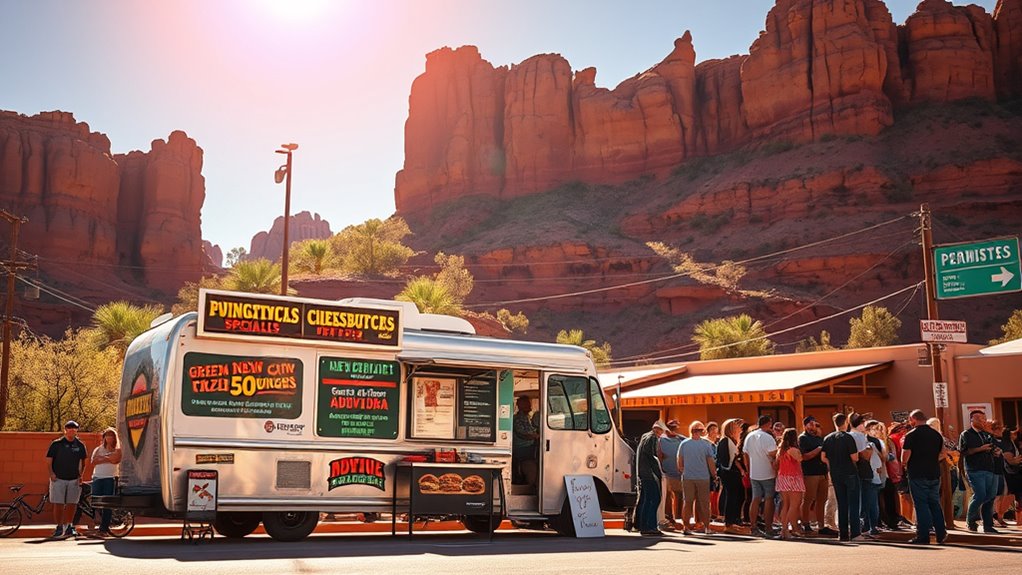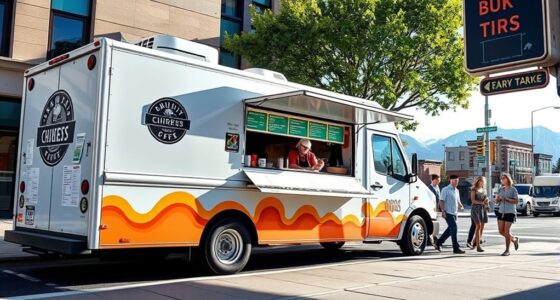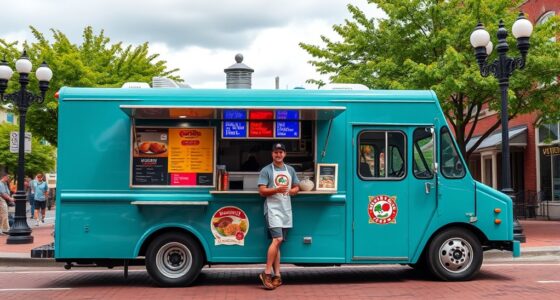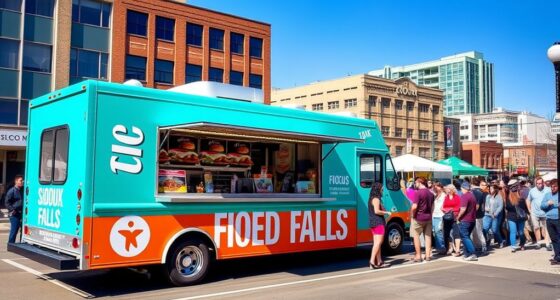To open a food truck in Albuquerque, you’ll need several permits, including a Mobile Food Vending Permit, Food Establishment Permit, and fire safety clearance, which can add up to several thousand dollars. Find high-traffic locations like downtown and festivals to attract customers. Develop a menu that highlights local flavors like green chile and blue corn. Using social media and community events will boost your presence. Continue exploring to discover how to navigate costs, compliance, and marketing for success.
Key Takeaways
- Obtain necessary permits including Mobile Food Vending, Food Establishment, and fire safety permits from Albuquerque and state authorities.
- Budget $40,000–$120,000 for vehicle, equipment, permits, insurance, and marketing expenses.
- Choose high-traffic locations like downtown, Old Town, or festivals, ensuring compliance with zoning and health codes.
- Develop a menu featuring regional ingredients and traditional dishes while adhering to food safety protocols.
- Use social media, participate in local events, and emphasize safety standards to effectively market and grow your food truck business.
Navigating the Permitting Process in Albuquerque

Navigating the permitting process in Albuquerque requires understanding the specific licenses and approvals needed to operate legally. First, you must obtain a Mobile Food Vending Permit from the City of Albuquerque’s Environmental Health Department. A Business License from the New Mexico Secretary of State is also essential for statewide legality. Additionally, you need a Food Establishment Permit from the New Mexico Environment Department (NMED) to meet food safety standards. Local permits, such as the Mobile Food Unit Permit, confirm compliance with city or county regulations. Before opening, secure a fire safety permit from the Albuquerque Fire Marshal. You’ll also need to submit documentation like business registration, tax certificates, and a commissary agreement. Completing a Food Protection Manager Certification and passing health inspections are vital steps to guarantee your truck meets all safety and health requirements. It is also important to stay updated on any changes to local regulations by consulting with city officials regularly.
Estimating the Expenses to Launch Your Food Truck
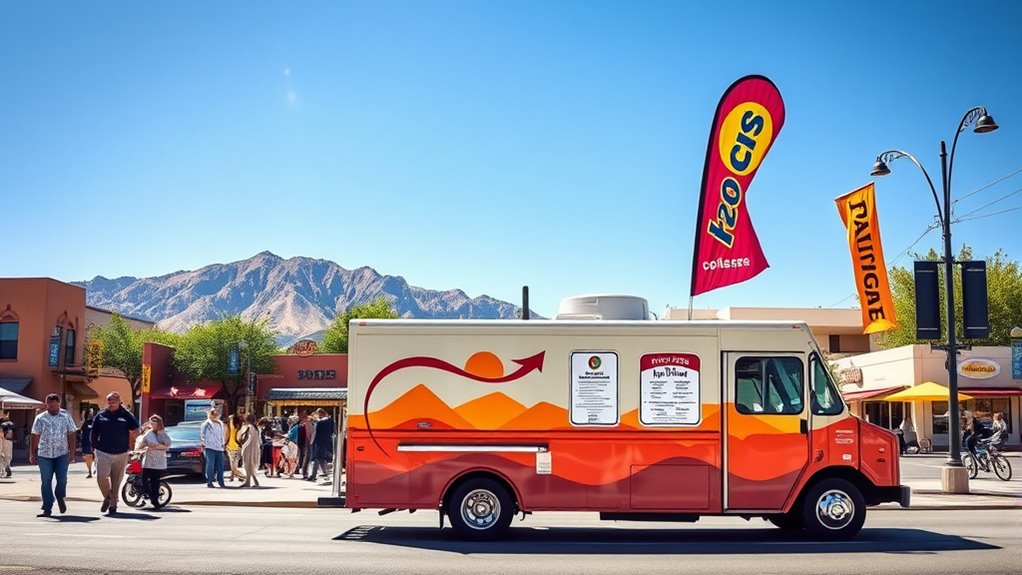
Launching a food truck involves a significant upfront investment that varies widely depending on your menu, location, and equipment choices. You’ll need to budget for several key expenses:
- Vehicle and Equipment – Expect to spend between $40,000 and $120,000 for a new truck or trailer, with custom builds on the higher end. Researching local builders and customization options can help you find the best value for your budget.
- Initial Inventory and Supplies – Budget around $2,000 to $3,000 for ingredients, serveware, and basic supplies.
- Licensing, Permits, and Insurance – Costs can range from a few hundred to over $28,000 for permits, plus about $6,000 annually for insurance.
- Marketing and Branding – Allocate $2,000 to $5,000 for wraps, signage, and digital marketing efforts.
Finding Prime Spots for Maximum Customer Reach
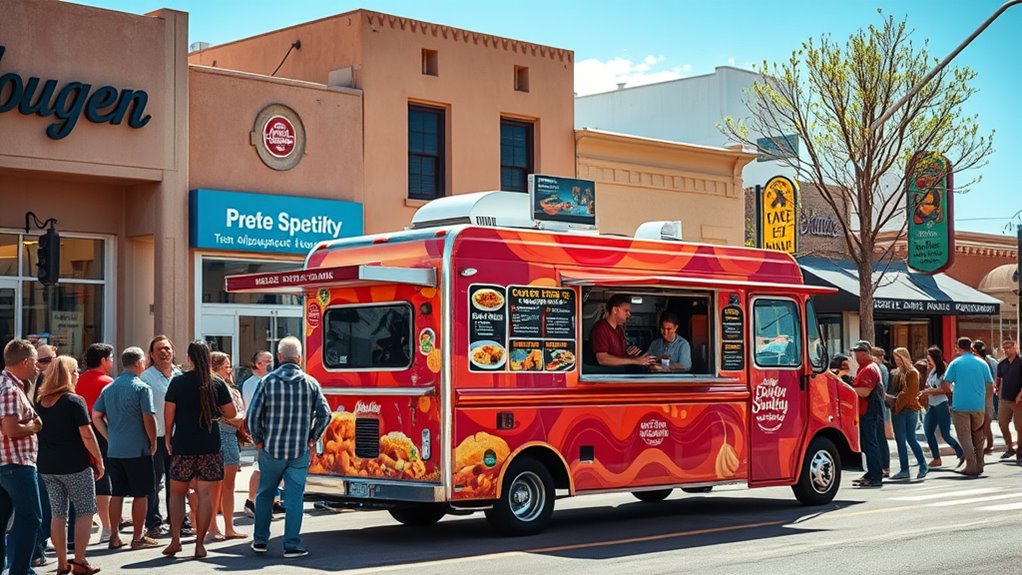
Choosing the right locations can make or break your food truck’s success in Albuquerque. To maximize customer reach, focus on high foot traffic areas, seasonal events, and busy corridors. Popular spots include downtown, Old Town Plaza, and near major events like the Balloon Fiesta. The University of New Mexico campus and historic Route 66 attract diverse crowds. Consider partnering with farmers markets, festivals, and holiday markets for short-term boosts. Food truck clusters and proximity to breweries or coworking spaces can also draw regular patrons. Additionally, understanding market trends can help you select locations that align with customer preferences and seasonal demand.
Crafting a Menu That Celebrates Local Flavors
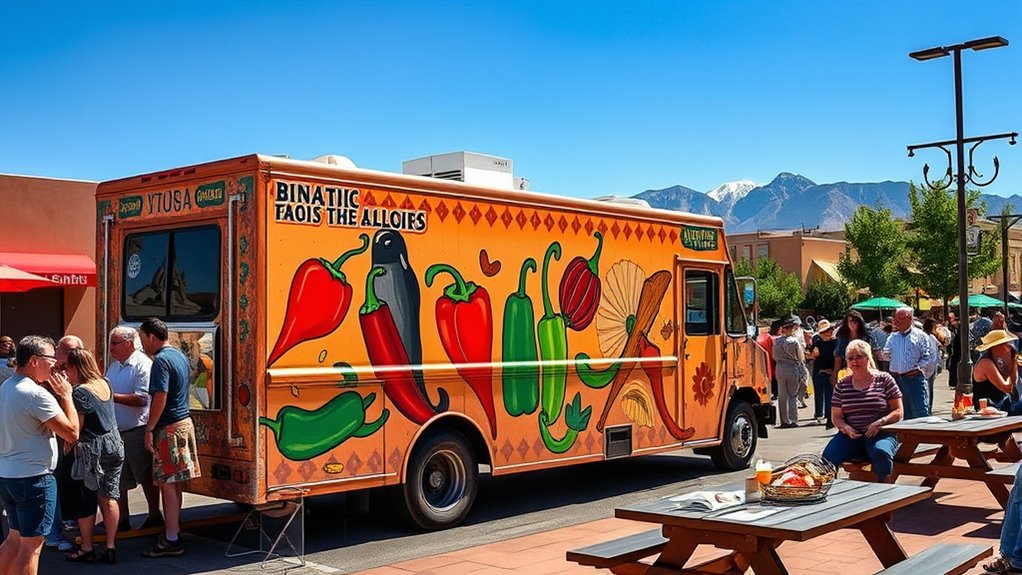
To create a menu that truly celebrates Albuquerque’s rich culinary heritage, focus on incorporating signature local ingredients like red and green chile, blue corn, and pinto beans. These core flavors showcase the region’s unique tastes and appeal to both locals and tourists. Consider these strategies:
- Highlight traditional dishes like carne adovada and breakfast burritos with adjustable chile heat levels to cater to all spice preferences.
- Incorporate native staples such as blue corn in items like tortillas or desserts like atole.
- Use locally sourced ingredients, like Lovington pecans, to add creative twists like pecan ramen or desserts. Farmhouse-inspired decor can also help create an inviting atmosphere that complements the local culinary experience.
- Offer vegetarian and fusion options that blend regional flavors with global cuisines, using house-made chile oils and fresh produce. This balance keeps your menu authentic yet accessible. Albuquerque’s cuisine is deeply rooted in its indigenous and Hispanic history, which influences many traditional dishes and flavors.
Effective Marketing Strategies to Grow Your Business
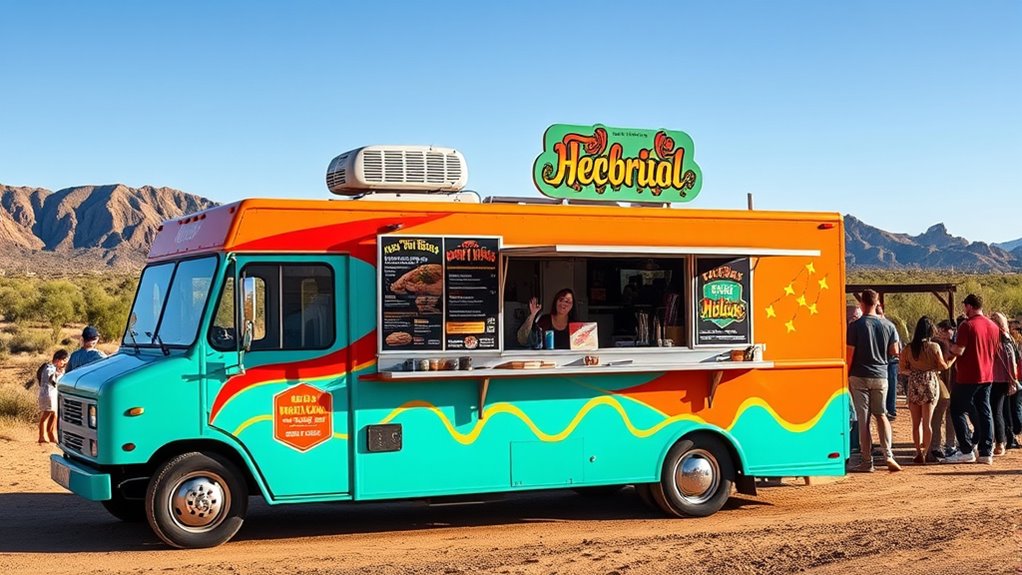
Effective marketing is essential for growing your food truck business and standing out in a competitive city like Albuquerque. Social media is a powerful tool—68% of food trucks use platforms regularly, with Facebook leading at 75%. Engaging campaigns can boost sales by 20%, while food truck location apps have increased downloads by 35%, helping attract new customers. Participating in local events and festivals, which 80% of trucks do annually, enhances visibility and drives immediate sales. Implementing loyalty programs increases repeat visits by 30%, strengthening customer loyalty. Using data analytics helps optimize marketing efforts, yielding 25% higher ROI. Digital tools like GPS and review platforms enable better customer targeting and feedback management, which further enhances marketing effectiveness. Focusing on relationship-building with your audience fosters trust and encourages word-of-mouth referrals, amplifying your reach organically. Focus on targeting millennials and highlighting your unique offerings to attract diverse, enthusiastic customers. Combining these strategies positions your truck for sustained growth in Albuquerque.
Ensuring Compliance and Operational Success
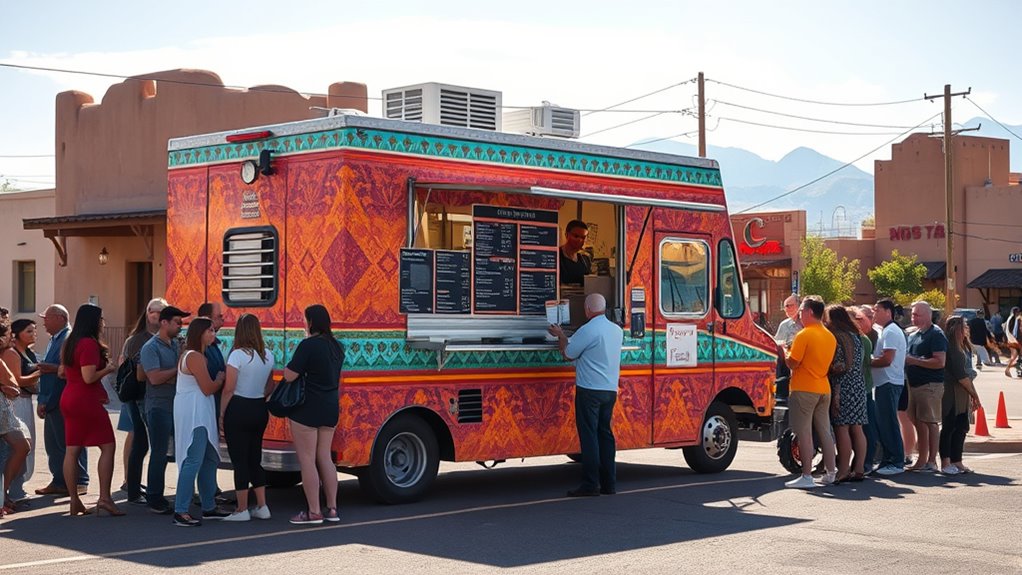
To keep your food truck compliant and running smoothly, you need to prioritize regular inspections and food safety practices. These protocols help you catch potential issues early and guarantee you meet all health and safety standards. Staying proactive in these areas will protect your business and build customer trust. Proper permits and licenses are essential to ensure your operations remain legal and avoid costly fines. Additionally, maintaining food safety practices is vital for long-term success and customer satisfaction.
Regular Inspection Protocols
How can food truck operators make certain they stay compliant with Albuquerque’s inspection protocols? First, schedule and prepare for pre-opening inspections by ensuring water tanks and equipment are fully operational. Keep track of annual renewal inspections by maintaining up-to-date permits and records. Be aware that routine health inspections vary based on food risk levels, with higher-risk operations inspected more frequently. Also, promptly address complaint-based inspections triggered by reports of violations, especially those related to safety or health. Lastly, coordinate fire department inspections if you use open flames or specialized equipment. To stay compliant:
- Maintain current permits, licenses, and inspection records.
- Regularly verify equipment and structural compliance.
- Keep detailed cleaning and maintenance logs.
- Ensure staff hold valid food handler certifications.
- Kia Tuning options can be explored to optimize vehicle performance, which is especially important if your food truck requires frequent travel or off-road capability to reach certain locations.
Food Safety Practices
Maintaining proper food safety practices is essential for guaranteeing compliance and running a successful food truck operation in Albuquerque. You must keep TCS foods at correct temperatures to prevent bacterial growth, and avoid cooling or reheating in pushcarts by sticking to single-use cooking cycles. Use ice chests that drain continuously and keep cold hold temperatures as required. Ensure handwash sinks are stocked with hot and cold water, soap, and disposable towels. Your fresh water tanks should have proper drainage and covers, with waste tanks at least 15% larger. Use ANSI-certified equipment, and if cooking with open flames, install commercial exhaust hoods with fire suppression. Regularly inspect, sanitize, and document safety measures to protect customers and stay compliant with local health regulations. Proper temperature monitoring devices are crucial for maintaining compliance and ensuring food safety during all operations. Additionally, incorporating food safety training for staff can significantly reduce risks and promote a culture of safety within your operation.
Frequently Asked Questions
How Long Does the Permit Approval Process Typically Take in Albuquerque?
You’re wondering how long permit approval takes in Albuquerque. Typically, after you submit your application and all required documents, it takes several weeks for approval. Scheduling the pre-opening inspection depends on inspector availability and application completeness. Keep in mind that delays can happen if your paperwork is incomplete or submitted late. Planning ahead and ensuring all documents are ready speeds up the process, helping you get your permits faster.
Are There Any Specific Zoning Restrictions for Food Trucks in Albuquerque?
Imagine parking your food truck, only to find hidden rules lurking nearby. Albuquerque’s zoning restrictions are strict yet clear. You must avoid blocking parking spots or access points, stay at least 10 feet from entrances, and keep 75 feet from neighboring food establishments unless permitted. Operating in residential zones limits your days, and outdoor activities face restrictions. Follow these regulations, and your food truck journey stays smooth and compliant.
What Are the Insurance Requirements for Operating a Food Truck?
You need to guarantee your food truck has the right insurance coverage to operate legally and protect your business. This includes mandatory commercial auto insurance with liability coverage for any vehicles used solely for business. You should also get general liability insurance to cover accidents or claims from customers or vendors. Additionally, check local requirements for event-specific coverage, and consider extra protections like business interruption or product liability to safeguard your investment.
Can I Operate a Food Truck Without a Commissary in Albuquerque?
It’s amusing to think you can run a food truck without a commissary in Albuquerque—yet, the law says otherwise. You absolutely need a licensed commissary to operate legally, as it’s essential for storage, sanitation, and safety compliance. Skipping this step risks permit denial or revocation. So, if you want to stay on the right side of regulations, you’ll need to partner with a certified commissary before hitting the streets.
Are There Grants or Financial Assistance Programs Available for New Food Trucks?
You’re wondering if there are grants or financial assistance programs for new food trucks. Luckily, Albuquerque offers entrepreneurial grants of up to $10,000 through city programs aimed at small businesses, including food trucks. Additionally, regional initiatives and USDA rural grants might help if your truck serves underserved areas. To maximize your chances, research eligibility criteria, gather necessary documents, and consider reaching out to city or regional economic development offices for support.
Conclusion
Starting your food truck in Albuquerque is like planting a seed—nurture it with permits, prime locations, and a menu that captures local flavor. With the right marketing, your truck will bloom into a beloved fixture on the streets. Remember, every step you take is a brick in building your dream. So, gear up and turn those wheels; your culinary adventure in Albuquerque awaits—ready to serve, share, and succeed.
